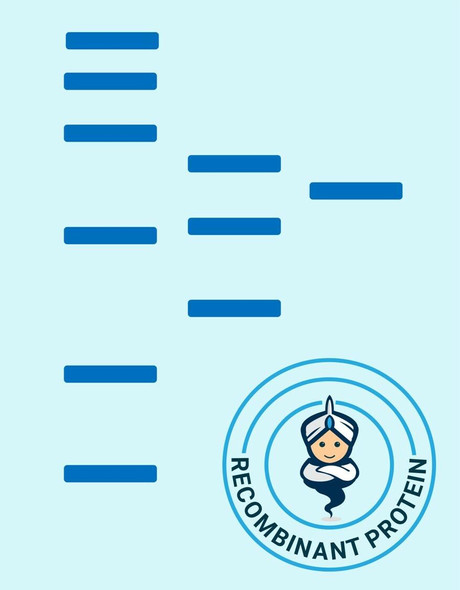Description
| Product Name: | Human KLRD1 Recombinant Protein |
| Product Code: | RPPB3805 |
| Size: | 5µg |
| Species: | Human |
| Target: | KLRD1 |
| Synonyms: | Killer Cell Lectin Like Receptor D1, Killer Cell Lectin-Like Receptor Subfamily D, Member 1,� NK Cell Receptor, CD94 Antigen, CD94, KP43, Killer Cell Lectin-Like Receptor Subfamily D Member 1, Natural Killer Cells Antigen CD94,� KLRD1.��� |
| Source: | Sf9 Insect cells |
| Physical Appearance: | Sterile Filtered colorless solution. |
| Formulation: | KLRD1 protein solution (0.5mg/ml) contains Phosphate buffered saline (pH7.4) and 10% glycerol. |
| Stability: | Store at 4°C if entire vial will be used within 2-4 weeks. Store, frozen at -20°C for longer periods of time. For long term storage it is recommended to add a carrier protein (0.1% HSA or BSA).Avoid multiple freeze-thaw cycles. |
| Purity: | Greater than 95.0% as determined by SDS-PAGE. |
| Amino Acid Sequence: | ADPKNSFTKL SIEPAFTPGP NIELQKDSDC CSCQEKWVGY RCNCYFISSE QKTWNESRHL CASQKSSLLQ LQNTDELDFM SSSQQFYWIG LSYSEEHTAW LWENGSALSQ YLFPSFETFN TKNCIAYNPN GNALDESCED KNRYICKQQL IHHHHHH |
KLRD1, also known as Killer Cell Lectin Like Receptor D1, is expressed on the surface of natural killer cells in the innate immune system. KLRD1 functions as a receptor for the recognition of MHC class I HLA-E molecules by NK cells and some cytotoxic T-cells. KLRD1 can create disulfide-bonded heterodimer with NKG2 family members. CD94 & NKG2 complex interacts with (HLA)-E, Human Leukocyte Antigen on target cells on the surface of natural killer cells.
KLRD1 produced in Sf9 Baculovirus cells is a single, glycosylated polypeptide chain (32-179 a.a.) and fused to a 6 aa His Tag at C-terminus containing a total of 157 amino acids and having a molecular mass of 18.2kDa.KLRD1 shows multiple bands between 18-28kDa on SDS-PAGE, reducing conditions and purified by proprietary chromatographic techniques.
| UniProt Protein Function: | KLRD1: Plays a role as a receptor for the recognition of MHC class I HLA-E molecules by NK cells and some cytotoxic T-cells. 3 isoforms of the human protein are produced by alternative splicing. |
| UniProt Protein Details: | Protein type:Membrane protein, integral Chromosomal Location of Human Ortholog: 12p13 Cellular Component: integral to membrane; plasma membrane; receptor complex; external side of plasma membrane Molecular Function:protein binding; transmembrane receptor activity; carbohydrate binding Biological Process: regulation of immune response; cell surface receptor linked signal transduction; natural killer cell mediated immunity; innate immune response |
| NCBI Summary: | Natural killer (NK) cells are a distinct lineage of lymphocytes that mediate cytotoxic activity and secrete cytokines upon immune stimulation. Several genes of the C-type lectin superfamily, including members of the NKG2 family, are expressed by NK cells and may be involved in the regulation of NK cell function. KLRD1 (CD94) is an antigen preferentially expressed on NK cells and is classified as a type II membrane protein because it has an external C terminus. Several transcript variants encoding different isoforms have been found for this gene. [provided by RefSeq, May 2017] |
| UniProt Code: | Q13241 |
| NCBI GenInfo Identifier: | 334302835 |
| NCBI Gene ID: | 3824 |
| NCBI Accession: | Q13241.2 |
| UniProt Related Accession: | Q13241 |
| Molecular Weight: | |
| NCBI Full Name: | Natural killer cells antigen CD94 |
| NCBI Synonym Full Names: | killer cell lectin like receptor D1 |
| NCBI Official Symbol: | KLRD1�� |
| NCBI Official Synonym Symbols: | CD94�� |
| NCBI Protein Information: | natural killer cells antigen CD94 |
| UniProt Protein Name: | Natural killer cells antigen CD94 |
| UniProt Synonym Protein Names: | KP43; Killer cell lectin-like receptor subfamily D member 1; NK cell receptor; CD_antigen: CD94 |
| UniProt Gene Name: | KLRD1�� |
| UniProt Entry Name: | KLRD1_HUMAN |






